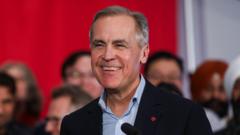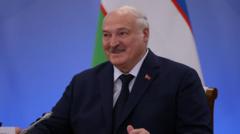In a significant political development, Justin Trudeau has announced he will resign as Canada’s Prime Minister and leader of the Liberal Party, marking the end of his nearly decade-long leadership amid economic uncertainties and rising voter dissatisfaction.
Trudeau Steps Down: Canada Faces Political Unrest

Trudeau Steps Down: Canada Faces Political Unrest
Justin Trudeau resigns as Prime Minister amid rising voter discontent and economic challenges.
On January 6, 2025, Trudeau made the announcement during a press conference outside his residence in Ottawa, stating, “It’s time for a reset.” This decision comes during a tumultuous period for Canada, characterized by a gridlocked parliament and the incoming Trump administration threatening tariffs on Canadian imports.
While Trudeau will remain in office until a new leader is chosen through the party election, he acknowledged that his continued leadership has become a source of contention within the party. “I truly feel that removing the contention around my own continued leadership is an opportunity to bring the temperature down,” he said.
Since entering office in November 2015, Trudeau had been viewed as a progressive figure; however, he now becomes another Western leader facing backlash due to anti-incumbency sentiments, rising immigration anxiety, and the lingering economic impact of the COVID-19 pandemic. Current economic indicators show inflation has tapered below 2 percent, yet unemployment remains high above 6 percent.
Trudeau referred to the approaching general elections that must occur by October, recognizing the need for change in leadership. “It’s become obvious to me with the internal battles that I cannot be the one to carry the Liberal standard into the next election,” he stated, as Canada braces for a crucial political transition amidst turbulence.
While Trudeau will remain in office until a new leader is chosen through the party election, he acknowledged that his continued leadership has become a source of contention within the party. “I truly feel that removing the contention around my own continued leadership is an opportunity to bring the temperature down,” he said.
Since entering office in November 2015, Trudeau had been viewed as a progressive figure; however, he now becomes another Western leader facing backlash due to anti-incumbency sentiments, rising immigration anxiety, and the lingering economic impact of the COVID-19 pandemic. Current economic indicators show inflation has tapered below 2 percent, yet unemployment remains high above 6 percent.
Trudeau referred to the approaching general elections that must occur by October, recognizing the need for change in leadership. “It’s become obvious to me with the internal battles that I cannot be the one to carry the Liberal standard into the next election,” he stated, as Canada braces for a crucial political transition amidst turbulence.























